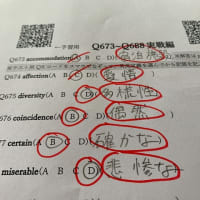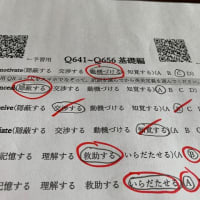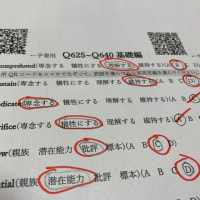春の選抜高校野球が始まりました。特待生やら選手の酷使やらさまざまな問題があるにしても、キャッチボールができない段階で併殺を教えるようなアホ監督は日本中探してもいないと思います。しかし日本の英語教育、とりわけ大学入試英語では童話が満足に読めない受験生に論説文を読ませるような愚行が少なくないのが現状です。基礎ができていない段階で応用をやらせても英語嫌いを量産するだけです。まずはやさしいものを速く正確に読む訓練が欠かせません。
そんなわけで、著作権の切れた童話「ドリトル先生航海記」から、シンプルで、大学入試にもTOEICにも英検にも有効な練習問題を作成しています。楽しみながら英語力を伸ばしていただければ幸いです。
コロンで区切られているのが四語選択問題、スラッシュで区切られているのが四語整序問題です。四語選択問題の単語は大学入試、英検、TOEICに共通する重要単語で*印は難易度の目安です。*印が多いほど難しい単語になっています。無印は語法・文法等の問題です。
※(12)の解答 ①(get worried about him)②(gazing)③(them by any means)④(far to look after)⑤(grow up to be)⑥(untidy)⑦(father busy on practising)⑧(tune)⑨(still)⑨(sighed)⑩(play us something else)⑪(to make him feel)⑫(examined)⑬(frightened)
I held a candle while the Doctor tied the leg up in what he called "splints," which ⑭(he made out of) match-sticks with his pen-knife.←ここからDoctorがマッチの軸から作った"splints,"とは何かおわかりでしょうか?辞書を引く前に考えてみてください。⑮(let him run about)⑯(assured)⑰(how his family are)⑱(lie still doing nothing)⑲(realize)⑳(with writing on it)
(13)
I often look back upon that night long, long ago. And if I close my eyes and think hard I can see that parlor just as it was then: a funny little man in coat-tails, with a round kind face, playing away on the flute in front of the fire; my mother on one side of him and my father on the other, holding their breath and listening ①(eyes / with / shut / their); myself, with Jip, squatting on the carpet at his feet, staring into the coals; and Polynesia perched on the mantlepiece beside his shabby high hat, gravely ②(her / swinging / from / head ) side to side in time to the music. I see it all, just ③(were / as / it / though) before me now.
And then I remember how, after we had seen the Doctor out at the front door, we all came back into the parlor and talked about him till it was still later; and even after I did go to bed (I had never stayed up so late in my life before) I dreamed about him and a band of strange clever animals that played flutes and fiddles and drums the whole night through.
THE SEVENTH CHAPTER. SHELLFISH TALK
THE next morning, ④(since : as : when : although) I had gone to bed so late the night before, I was up frightfully early. The first sparrows were just beginning to chirp sleepily on the slates outside my attic window when I jumped out of bed and scrambled into my clothes.
I could ⑤(almost : hardly : always : usually) wait to get back to the little house with the big garden—to see the Doctor and his private zoo. For the first time in my life I forgot all about breakfast; and creeping down the stairs on tip-toe, so ⑥(wake / as / to / not) my mother and father, I opened the front door and popped out into the empty, silent street.
When I got to the Doctor's gate I suddenly thought that perhaps it was too early to call on any one: and I began to wonder if the Doctor would be up yet. I looked ⑦(for : after : into : like) the garden. No one seemed to be about. So I opened the gate quietly and went inside.
As I turned to the left to go down a path between some hedges, I heard a voice quite close to me say,
"Good morning. How early you are!"
I turned around, and there, sitting on the top of a privet hedge, was the gray parrot, Polynesia.
"Good morning," I said. "I ⑧*(indicate : suppose : mention : attempt) I am rather early. Is the Doctor still in bed?"
"Oh no," said Polynesia. "He has been up an hour and a half. You'll find him in the house somewhere. The front door is open. Just push it and go in, He is sure to be in the kitchen cooking breakfast—or ⑨(study / his / in / working). Walk right in. I am waiting to see the sun rise. But upon my word I believe it's forgotten to rise. It is an awful climate, this. Now if we were in Africa the world would be blazing with sunlight at this hour of the morning. Just see that mist rolling over those cabbages. It is enough to give you rheumatism to look at it. Beastly climate—Beastly! Really I don't know why anything but frogs ever stay in England—Well, don't let me keep you. Run along and see the Doctor."
"Thank you," I said. "I'll go and look for him."
When I opened the front door I could smell bacon frying, so I ⑩(my / made / to / way ) the kitchen. There I discovered a large kettle boiling away over the fire and some bacon and eggs in a dish upon the hearth. It seemed to me that the bacon was getting all dried up with the heat. So I pulled the dish a little further away from the fire and went on through the house looking for the Doctor.
I found him at last in the Study. I did not know then that it was called the Study. It was ⑪*(recently : certainly : frequently : primarily) a very interesting room, with telescopes and microscopes and all sorts of other strange things which I did not understand about but wished I did. Hanging on the walls were pictures of animals and fishes and strange plants and collections of birds' eggs and sea-shells in glass cases.
The Doctor was standing at the main table in his dressing-gown. At first I thought he was washing his face. He had a square glass box before him full of water. He was holding one ear under the water ⑫(until : while : where : which) he covered the other with his left hand. As I came in he stood up.
"Good morning, Stubbins," said he. "Going to be a nice day, don't you think? I've just been listening to the Wiff-Waff. But he is very disappointing—very."
"Why?" I said. "Didn't you ⑬(he / find / has / that) any language at all?"
"Oh yes," said the Doctor, "he has a language. But it is such a poor language—only a few words, like 'yes' and 'no'—'hot' and 'cold.' That's all he can say. It's very disappointing. You see he really belongs to two ⑭(of / different / fishes / families). I thought he was going to be tremendously helpful—Well, well!"
"I suppose," said I, "that means he hasn't very much sense if his language is only two or three words?"
"Yes, I suppose it does. Possibly it is the kind ⑮(life / of / leads / he). You see, they are very rare now, these Wiff-Waffs—very rare and very solitary. They swim around in the deepest parts of the ocean entirely by themselves—always alone. So I ⑯**(convert : sustain : generate : presume) they really don't need to talk much."
"Perhaps some kind of a bigger shellfish would talk more," I said. "After all, he is very small, isn't he?"
"Yes," said the Doctor, "that's true. Oh I have no doubt that there are shellfish who are good talkers—not the least doubt. But the big shellfish—the biggest of them, are so hard to catch. They are only ⑰(in / to / found / be) the deep parts of the sea; and as they don't swim very much, but just crawl along the floor of the ocean most of the time, they are very seldom taken in nets. I do wish I could find some way of going down to the bottom of the sea. I could learn a lot if I could only do that. But we are forgetting all about breakfast—Have you had, breakfast yet, Stubbins?"
I told the Doctor that I had forgotten all about it and he at once led the way into the kitchen.
"Yes," he said, as he ⑱*(occured : poured : gathered : occupied) the hot water from the kettle into the tea-pot, "if a man could only ⑲(refer : manage : intend :apply) to get right down to the bottom of the sea, and live there a while, he would discover some wonderful things—things ⑳(have / that / never / people) dreamed of."
解答は次回発表。ご意見、ご要望等はsuzuyasu@wmail.plala.or.jpでも承っております。
そんなわけで、著作権の切れた童話「ドリトル先生航海記」から、シンプルで、大学入試にもTOEICにも英検にも有効な練習問題を作成しています。楽しみながら英語力を伸ばしていただければ幸いです。
コロンで区切られているのが四語選択問題、スラッシュで区切られているのが四語整序問題です。四語選択問題の単語は大学入試、英検、TOEICに共通する重要単語で*印は難易度の目安です。*印が多いほど難しい単語になっています。無印は語法・文法等の問題です。
※(12)の解答 ①(get worried about him)②(gazing)③(them by any means)④(far to look after)⑤(grow up to be)⑥(untidy)⑦(father busy on practising)⑧(tune)⑨(still)⑨(sighed)⑩(play us something else)⑪(to make him feel)⑫(examined)⑬(frightened)
I held a candle while the Doctor tied the leg up in what he called "splints," which ⑭(he made out of) match-sticks with his pen-knife.←ここからDoctorがマッチの軸から作った"splints,"とは何かおわかりでしょうか?辞書を引く前に考えてみてください。⑮(let him run about)⑯(assured)⑰(how his family are)⑱(lie still doing nothing)⑲(realize)⑳(with writing on it)
(13)
I often look back upon that night long, long ago. And if I close my eyes and think hard I can see that parlor just as it was then: a funny little man in coat-tails, with a round kind face, playing away on the flute in front of the fire; my mother on one side of him and my father on the other, holding their breath and listening ①(eyes / with / shut / their); myself, with Jip, squatting on the carpet at his feet, staring into the coals; and Polynesia perched on the mantlepiece beside his shabby high hat, gravely ②(her / swinging / from / head ) side to side in time to the music. I see it all, just ③(were / as / it / though) before me now.
And then I remember how, after we had seen the Doctor out at the front door, we all came back into the parlor and talked about him till it was still later; and even after I did go to bed (I had never stayed up so late in my life before) I dreamed about him and a band of strange clever animals that played flutes and fiddles and drums the whole night through.
THE SEVENTH CHAPTER. SHELLFISH TALK
THE next morning, ④(since : as : when : although) I had gone to bed so late the night before, I was up frightfully early. The first sparrows were just beginning to chirp sleepily on the slates outside my attic window when I jumped out of bed and scrambled into my clothes.
I could ⑤(almost : hardly : always : usually) wait to get back to the little house with the big garden—to see the Doctor and his private zoo. For the first time in my life I forgot all about breakfast; and creeping down the stairs on tip-toe, so ⑥(wake / as / to / not) my mother and father, I opened the front door and popped out into the empty, silent street.
When I got to the Doctor's gate I suddenly thought that perhaps it was too early to call on any one: and I began to wonder if the Doctor would be up yet. I looked ⑦(for : after : into : like) the garden. No one seemed to be about. So I opened the gate quietly and went inside.
As I turned to the left to go down a path between some hedges, I heard a voice quite close to me say,
"Good morning. How early you are!"
I turned around, and there, sitting on the top of a privet hedge, was the gray parrot, Polynesia.
"Good morning," I said. "I ⑧*(indicate : suppose : mention : attempt) I am rather early. Is the Doctor still in bed?"
"Oh no," said Polynesia. "He has been up an hour and a half. You'll find him in the house somewhere. The front door is open. Just push it and go in, He is sure to be in the kitchen cooking breakfast—or ⑨(study / his / in / working). Walk right in. I am waiting to see the sun rise. But upon my word I believe it's forgotten to rise. It is an awful climate, this. Now if we were in Africa the world would be blazing with sunlight at this hour of the morning. Just see that mist rolling over those cabbages. It is enough to give you rheumatism to look at it. Beastly climate—Beastly! Really I don't know why anything but frogs ever stay in England—Well, don't let me keep you. Run along and see the Doctor."
"Thank you," I said. "I'll go and look for him."
When I opened the front door I could smell bacon frying, so I ⑩(my / made / to / way ) the kitchen. There I discovered a large kettle boiling away over the fire and some bacon and eggs in a dish upon the hearth. It seemed to me that the bacon was getting all dried up with the heat. So I pulled the dish a little further away from the fire and went on through the house looking for the Doctor.
I found him at last in the Study. I did not know then that it was called the Study. It was ⑪*(recently : certainly : frequently : primarily) a very interesting room, with telescopes and microscopes and all sorts of other strange things which I did not understand about but wished I did. Hanging on the walls were pictures of animals and fishes and strange plants and collections of birds' eggs and sea-shells in glass cases.
The Doctor was standing at the main table in his dressing-gown. At first I thought he was washing his face. He had a square glass box before him full of water. He was holding one ear under the water ⑫(until : while : where : which) he covered the other with his left hand. As I came in he stood up.
"Good morning, Stubbins," said he. "Going to be a nice day, don't you think? I've just been listening to the Wiff-Waff. But he is very disappointing—very."
"Why?" I said. "Didn't you ⑬(he / find / has / that) any language at all?"
"Oh yes," said the Doctor, "he has a language. But it is such a poor language—only a few words, like 'yes' and 'no'—'hot' and 'cold.' That's all he can say. It's very disappointing. You see he really belongs to two ⑭(of / different / fishes / families). I thought he was going to be tremendously helpful—Well, well!"
"I suppose," said I, "that means he hasn't very much sense if his language is only two or three words?"
"Yes, I suppose it does. Possibly it is the kind ⑮(life / of / leads / he). You see, they are very rare now, these Wiff-Waffs—very rare and very solitary. They swim around in the deepest parts of the ocean entirely by themselves—always alone. So I ⑯**(convert : sustain : generate : presume) they really don't need to talk much."
"Perhaps some kind of a bigger shellfish would talk more," I said. "After all, he is very small, isn't he?"
"Yes," said the Doctor, "that's true. Oh I have no doubt that there are shellfish who are good talkers—not the least doubt. But the big shellfish—the biggest of them, are so hard to catch. They are only ⑰(in / to / found / be) the deep parts of the sea; and as they don't swim very much, but just crawl along the floor of the ocean most of the time, they are very seldom taken in nets. I do wish I could find some way of going down to the bottom of the sea. I could learn a lot if I could only do that. But we are forgetting all about breakfast—Have you had, breakfast yet, Stubbins?"
I told the Doctor that I had forgotten all about it and he at once led the way into the kitchen.
"Yes," he said, as he ⑱*(occured : poured : gathered : occupied) the hot water from the kettle into the tea-pot, "if a man could only ⑲(refer : manage : intend :apply) to get right down to the bottom of the sea, and live there a while, he would discover some wonderful things—things ⑳(have / that / never / people) dreamed of."
解答は次回発表。ご意見、ご要望等はsuzuyasu@wmail.plala.or.jpでも承っております。






















※コメント投稿者のブログIDはブログ作成者のみに通知されます